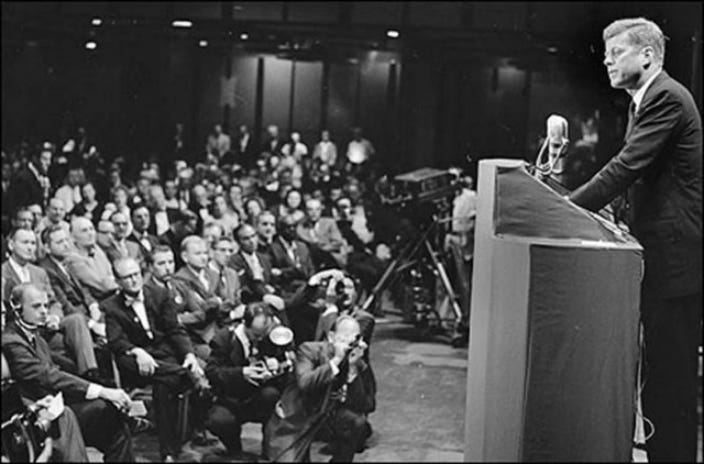In Defense of Free Speech. Scott Ritter

Secretary of State Antony Blinken recently declared an information war against the Russian media company RT.
He was assisted in this effort by James Rubin, the head of the State Department’s Global Engagement Center.
These two men, and the Biden administration, would do well to reflect on the words of John F. Kennedy, spoken in April 1961 at the height of the Cold War.
Speaking to an audience of American journalists, Kennedy declared that it is “our obligation to inform and alert the American people–to make certain that they possess all the facts that they need, and understand them as well–the perils, the prospects, the purposes of our program and the choices that we face.”
No President should fear public scrutiny of his program. For from that scrutiny comes understanding; and from that understanding comes support or opposition. And both are necessary. I am not asking your newspapers to support the Administration, but I am asking your help in the tremendous task of informing and alerting the American people. For I have complete confidence in the response and dedication of our citizens whenever they are fully informed.
I not only could not stifle controversy among your readers–I welcome it. This Administration intends to be candid about its errors; for as a wise man once said: ‘An error does not become a mistake until you refuse to correct it.’ We intend to accept full responsibility for our errors; and we expect you to point them out when we miss them.
Without debate, without criticism, no Administration and no country can succeed–and no republic can survive. That is why the Athenian lawmaker Solon decreed it a crime for any citizen to shrink from controversy. And that is why our press was protected by the First Amendment—the only business in America specifically protected by the Constitution—not primarily to amuse and entertain, not to emphasize the trivial and the sentimental, not to simply ‘give the public what it wants’—but to inform, to arouse, to reflect, to state our dangers and our opportunities, to indicate our crises and our choices, to lead, mold, educate and sometimes even anger public opinion.
This means greater coverage and analysis of international news—for it is no longer far away and foreign but close at hand and local. It means greater attention to improved understanding of the news as well as improved transmission. And it means, finally, that government at all levels, must meet its obligation to provide you with the fullest possible information outside the narrowest limits of national security—and we intend to do it.
.

President John F. Kennedy addresses the American Newspaper Publishers Association, April 17, 1961
.
Seen in this light, RT has been more “patriotic” in answering the challenge set forth by Kennedy than the entire US mainstream media.
I published some 285 opinion pieces in RT between December 2019 and August 2024.
And for this “crime” I’ve been attacked by the US government.
Even though I was engaged in “the only business specifically protected by the Constitution.”
The US government today fears criticism, because it has proven to be incapable of engaging in the kind of introspection that enables mistakes to be recognized and corrections made.
As Kennedy pointed out, without the debate, dialogue, and discussion that comes with critical review of policy, the American Republic cannot survive.
The censoring of any media outlet, including RT, silences the very critical debate America needs to survive.
We used to be strong and confident enough as a people—as a nation—to not wilt in the face of adversity.
In the war of ideas, when faced with defeat, we came up with better ideas.
Today we fear critical thinking.
The words and deeds of Secretary of State Antony Blinken and the head of the state Department’s Global Engagement Center, James Rubin, are not those of representatives of a nation confident in its cause, but the rearguard actions of desperate men confronted with the reality of a failing empire at odds with a world that is in the process of rejecting it.
The only path available to the American people that can lead to our collective survival as a Republic is to do our duty as citizens to push back against the tyranny of censorship and the ignorance it enshrines by using the weapons of free speech and a free press to challenge the dangerous and misguided actions and policies of those who represent us—and ultimately must be held accountable to us—in higher office.
This is the battle of the ages, one which will be recorded in history as a defining moment for the American Republic.
If we yield to the fear-based prejudices of the government, all is lost.
But if we rise to the occasion and seek to purify ourselves by embracing fact-based knowledge and, thus empowered, engage in the kind of public scrutiny that free speech and a free press enables, we will have a chance to make the kind of changes needed for our survival.
Every one of the articles I published in either RT or Sputnik were written in the spirit of John F. Kennedy.
And now the US government seeks to censor them.
To deny we, the people, access to the information these articles contained.
To keep us ignorant.
To discourage debate.
It is time for we the people to stand up.
It is time for we the people to speak out.
End censorship in America.
End the sanctions on RT and other Russian media.
And, in doing so, save the Republic we call home.
*
Click the share button below to email/forward this article to your friends and colleagues. Follow us on Instagram and Twitter and subscribe to our Telegram Channel. Feel free to repost and share widely Global Research articles.
Get Your Free Copy of “Towards a World War III Scenario: The Dangers of Nuclear War”!
Featured image: Secretary of State Antony Blinken (right) with GEC head James Rubin (left) (Source: Scott Ritter Extra)

